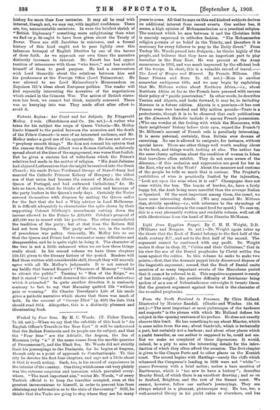Victoria Regina : her Court and her Subjects. By Fitzgerald
Molloy. 2 vols. (Hutchinson and Co. 24s. net.)—A writer who takes for his subject the reign of Queen Victoria—Mr. Molloy limits himself to the period between the accession and the death of the Prince Consort—is sure of an interested audience, and Mr. Molloy makes a good use of his opportunity. He does not always " prophesy smooth things." He does not conceal his opinion that the rumour that Prince Albert was a Roman Catholic, sedulously spread about at the time of the engagement, was worse than foolish. But he gives a curious list of volts-faces which the Prince's relatives had made in the matter of religion. His Aunt Julienne had abjured Lutheranism that she might be received into the Greek Church ; his uncle Prince Ferdinand George of Saxe-Coburg had married the Catholic Princess Kohary of Hungary ; the eldest son of that union had become the consort of Maria da
Queen of Portugal, and had embraced Catholicism," &c. He lets us know, too, what he thinks of the action and language of the party leaders in the Queen's early days. Certainly the Tories covered themselves with disgrace by making the Queen suffer for the fact that she had a Whig adviser in Lord Melbourne. It is difficult adequately to characterise the spite shown by their supporting Colonel Sibthorp's amendment cutting down the income allowed to the Prince to £30,000. Cobden's proposal of £21,000 was in accord with his position. The other contradicted the tradition of the party; but at that time the Reform Bill had not been forgiven. The party action, too, in the matter of precedence was paltry. Generally, Mr. Molloy lets us see that the Queen and Prince had to encounter many difficulties and disagreeables, and he is quite right in doing it. The character *of the two is not a little enhanced when we see how these things really stood. In his second volume we have three chapters (10-12) given to the literary history of the period. Readers will find them written with considerable skill, though they will scarcely agree with all Mr. Molloy's judgments. It is not correct to say baldly that Samuel Rogers's " Pleasures of Memory" " failed to attract the public." Turning to " Men of the Reign," we find it stated "that it well deserved the attention and admiration which it attracted." In quite another direction it is curiously contrary to fact to say that Macaulay quitted life " without pain or warning." Sir Charles Trevelyan's Life of his uncle gives a pathetic narrative which shows that there was much of both. In the account of "George Eliot" (p. 420) the date 1844 should read 1854. Altogether, this is a distinctly /pleasant and illuminating book.






































 Previous page
Previous page